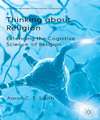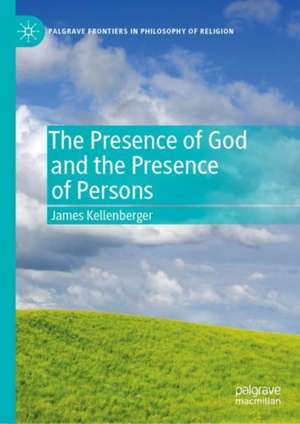The Presence of God and the Presence of Persons: Palgrave Frontiers in Philosophy of Religion
Autor James Kellenbergeren Limba Engleză Hardback – 20 aug 2019
Kellenberger explores how coming into the presence of persons is structurally analogous with coming into the presence of God. Providing a highly focused analysis of the two seemingly distinct concepts, normally thought to fall under different subfields of philosophy, the chapters carefully draw paralells between them. Kellenberger then goes on show how, analogous to “the death of God,” a loss of the consciousness of the reality of God and his presence, is a “death of persons”, felt as a loss of the sense of the inherent worth ofpersons and their presence. This volume finishes with an examination of the concrete moral and religio-ethical implications of coming into the presence of persons, and in particular the implications of coming into the presence of all persons.
Din seria Palgrave Frontiers in Philosophy of Religion
- 20%
 Preț: 691.33 lei
Preț: 691.33 lei - 15%
 Preț: 522.56 lei
Preț: 522.56 lei - 18%
 Preț: 727.18 lei
Preț: 727.18 lei -
 Preț: 391.61 lei
Preț: 391.61 lei - 18%
 Preț: 725.43 lei
Preț: 725.43 lei -
 Preț: 350.12 lei
Preț: 350.12 lei -
 Preț: 391.61 lei
Preț: 391.61 lei - 15%
 Preț: 641.53 lei
Preț: 641.53 lei - 18%
 Preț: 727.18 lei
Preț: 727.18 lei -
 Preț: 386.99 lei
Preț: 386.99 lei - 15%
 Preț: 634.82 lei
Preț: 634.82 lei -
 Preț: 263.45 lei
Preț: 263.45 lei -
 Preț: 357.63 lei
Preț: 357.63 lei -
 Preț: 386.81 lei
Preț: 386.81 lei - 18%
 Preț: 786.66 lei
Preț: 786.66 lei -
 Preț: 452.03 lei
Preț: 452.03 lei -
 Preț: 387.75 lei
Preț: 387.75 lei -
 Preț: 381.98 lei
Preț: 381.98 lei -
 Preț: 382.18 lei
Preț: 382.18 lei -
 Preț: 386.81 lei
Preț: 386.81 lei - 18%
 Preț: 789.20 lei
Preț: 789.20 lei - 15%
 Preț: 524.88 lei
Preț: 524.88 lei -
 Preț: 482.17 lei
Preț: 482.17 lei - 15%
 Preț: 529.92 lei
Preț: 529.92 lei - 18%
 Preț: 787.61 lei
Preț: 787.61 lei - 18%
 Preț: 722.12 lei
Preț: 722.12 lei -
 Preț: 387.96 lei
Preț: 387.96 lei -
 Preț: 393.52 lei
Preț: 393.52 lei - 18%
 Preț: 1122.42 lei
Preț: 1122.42 lei -
 Preț: 391.61 lei
Preț: 391.61 lei
Preț: 380.07 lei
Nou
Puncte Express: 570
Preț estimativ în valută:
72.74€ • 75.66$ • 60.05£
72.74€ • 75.66$ • 60.05£
Carte tipărită la comandă
Livrare economică 12-26 aprilie
Preluare comenzi: 021 569.72.76
Specificații
ISBN-13: 9783030250447
ISBN-10: 303025044X
Pagini: 101
Ilustrații: X, 99 p. 1 illus.
Dimensiuni: 148 x 210 mm
Greutate: 0.23 kg
Ediția:1st ed. 2019
Editura: Springer International Publishing
Colecția Palgrave Pivot
Seria Palgrave Frontiers in Philosophy of Religion
Locul publicării:Cham, Switzerland
ISBN-10: 303025044X
Pagini: 101
Ilustrații: X, 99 p. 1 illus.
Dimensiuni: 148 x 210 mm
Greutate: 0.23 kg
Ediția:1st ed. 2019
Editura: Springer International Publishing
Colecția Palgrave Pivot
Seria Palgrave Frontiers in Philosophy of Religion
Locul publicării:Cham, Switzerland
Cuprins
1. Introduction.- 2. The Presence of Persons.- 3. The Moral Import of Persons.- 4. A Relationship to Persons.- 5. An Affective Response to Persons.- 6. A Recognition of the Inherent Worth of Persons.- 7. The Presence of God.- 8. The Religious Import of God.- 9. A Relationship to God.- 10. An Affective Response to God.- 11. The Recognition of God.- 12. The Presence of Persons and the Presence of God.- 13. The Death of God and the Death of Persons.- 14. Moral and Religio-Moral Implications.
Notă biografică
James Kellenberger is Emeritus Professor of Philosophy at California State University, Northridge, USA. His previous books include Kierkegaard and Nietzsche, Dying to Self and Detachment, and, most recently, The Asymptote of Love and Religion, Pacifism, and Nonviolence.
Textul de pe ultima copertă
This book treats the presence of God and the presence of persons. The experience of the presence of God is a well-recognized religious experience in theistic traditions. The experience of the presence of persons, this book argues, is an analogous moral experience. As it is possible for individuals to come into the presence of God – to have this phenomenal experience – so it is possible for them to come into the presence of persons.
Kellenberger explores how coming into the presence of persons is structurally analogous with coming into the presence of God. Providing a highly focused analysis of the two seemingly distinct concepts, normally thought to fall under different subfields of philosophy, the chapters carefully draw paralells between them. Kellenberger then goes on show how, analogous to “the death of God,” a loss of the consciousness of the reality of God and his presence, is a “death of persons”, felt as a loss of the sense of the inherent worth of persons and their presence. This volume finishes with an examination of the concrete moral and religio-ethical implications of coming into the presence of persons, and in particular the implications of coming into the presence of all persons.
Kellenberger explores how coming into the presence of persons is structurally analogous with coming into the presence of God. Providing a highly focused analysis of the two seemingly distinct concepts, normally thought to fall under different subfields of philosophy, the chapters carefully draw paralells between them. Kellenberger then goes on show how, analogous to “the death of God,” a loss of the consciousness of the reality of God and his presence, is a “death of persons”, felt as a loss of the sense of the inherent worth of persons and their presence. This volume finishes with an examination of the concrete moral and religio-ethical implications of coming into the presence of persons, and in particular the implications of coming into the presence of all persons.
Caracteristici
Offers the first philosophical treatment of the presence of God and the presence of persons as analogues of one another Systematically and methodically tracks the parallels between the two phenomena Proposes the 'death of God' as analogous to the 'death persons', felt as a loss of the sense of the inherent worth of persons and their presence
